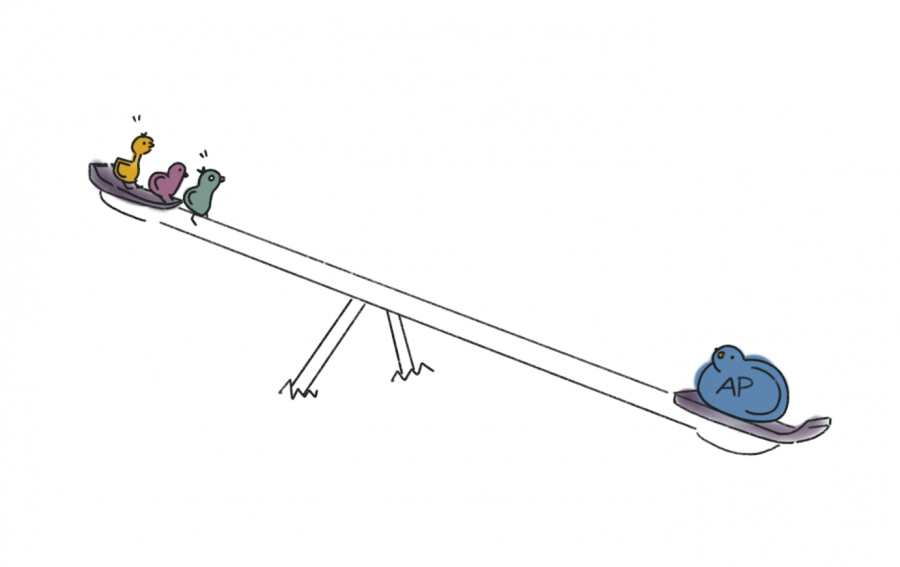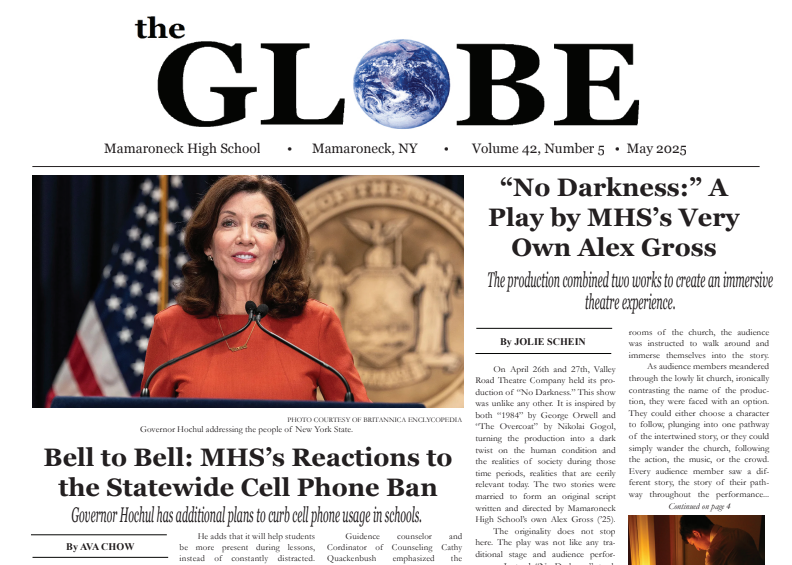Should Advanced Classes Be Weighted at MHS?
The scale demonstrates the impact of weighted and unweighted classes on the GPA of MHS students.
December 31, 2021
The system of weighting grades relies on giving greater value to Advanced Placement (AP) and honors courses in calculating students’ academic averages than “regular” classes. A 90 in an AP course, for instance, may be translated to a 95 because of how the class is more challenging. Under a weighted system, students who take more rigorous course loads will see higher averages than students who do not, simply by virtue of the increased difficulty of their classes. This policy of inflating the GPAs of AP and honors students for imposing greater challenges on themselves is not one that Mamaroneck High School (MHS) currently holds. Members of the Globe’s staff are torn on whether it should be.
Mamaroneck’s unweighted grading policy, many Globe staff members argue, may be detrimental to the mental health of AP and honors students. Because these students are often used to receiving high grades, sudden and significant drops in their averages upon starting more challenging courses can be shocking and major sources of stress. Students frequently sacrifice their emotional well-being for improved marks as a result. Seeing higher grades that more accurately reflect the increased rigor of AP and honors students’ workloads may discourage such sacrifices from being made.
Additionally, weighted-grade supporters view the policy as an effective means of making class-rank determinations fairer. With MHS’s present grading system, a graduating class’s valedictorian or salutatorian does not necessarily have had to have taken a rigorous course load, as long as he or she maintained the highest average in the class. It is possible, then, that a student with a perfect average taking no AP or honors courses whatsoever could rank higher than a student taking several such courses with a high, though not perfect, average. For increased academic difficulty to be a potential barrier to making a high class rank is not fair to students who have chosen to pursue these more challenging courses. Taking such challenges upon oneself should be celebrated, and many Globe members assert that MHS’s current method of evaluating class rank has the potential to become a sort of punishment for students challenging themselves with AP or honors courses.
Not all members of the Globe staff agree that unweighted GPAs posed any issue in fairly determining class rank at MHS, however. Almost invariably, the valedictorian and salutatorian happen to be students taking highly rigorous courses. A situation wherein students taking exclusively “regular” classes rank at the top of MHS’s graduating class has yet to arise. And as students with the highest averages virtually always take an array of AP and honors courses, any possibility of such a situation transpiring is slim.
As for whether weighting students’ grades could be benificial for students’ mental health, opponents to this policy see grade drops resulting from the novel difficulty of AP and honors classes as an integral part of the high school experience. Challenging as it may be to receive grades lower than one would like, these staff members pointed out that AP courses are intended to be of similar difficulty to college ones. Grades are not skewed in college simply because college is a greater academic challenge than high school, and thus if APs are truly to help prepare MHS students for higher education, unweighted grading is a necessity.
Despite this disagreement, proponents and opponents of weighting grades agree that adopting a weighted policy could result in a rise in pressure among MHS students to take advanced courses, as the system would result in lower averages for students in all-“regular” classes than for those taking honors and AP classes. Still, the Globe staff remains split on whether this pressure could actually help MHS students. Some believe that excessive pressure to take honors and AP courses will result in students taking classes they take no interest in and are ill-prepared for, both of which would diminish quality of student life at MHS. Conversely, a number of those in favor of grade weighting view saddling oneself with large academic challenges as a good way to prepare for college. The pressure to take AP classes that would come with a weighted system could ultimately produce a student body better equipped to confront the academic challenges that their post-high school education will surely provide.
Making the change to a weighted grading system at MHS could radically alter students’ academic lives. The debate as to if this alteration would be a beneficial one rages among MHS’s student body. It is apparent that there are many students on each side of this conversation – and their voices should not be left out of whether the Mamaroneck administration chooses to keep its current grading policy or amend it.






